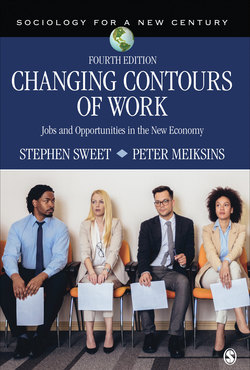Читать книгу Changing Contours of Work - Stephen Sweet - Страница 37
На сайте Литреса книга снята с продажи.
Conclusion
ОглавлениеDoes the existence of new products and new ways of working verify the existence of a new economy? The answer is both yes and no. The U.S. economy has shifted away from a primary reliance on its manufacturing base, and the expanding service sector is creating new job demands, as well as opportunities. So, the economy is new in respect to the diversity of goods and services produced. But in many of the new jobs and industries, old ways of working and managing work are applied, indicating the persistence of the old economy. While some of the new jobs require different skill sets, substantial portions of the labor force work in low-skill jobs that require few skills, again indicating that not everything has changed. While organizations have redefined manager-worker relationships and are relinquishing more control to workers, some of these changes appear to be window dressing and in other circumstances have not led to a true enhancement of job quality. While the new economy offers prospects for flexible work, availability is limited and uneven. And while the global economy has shifted work opportunities, some of these changes are not so much new as they are extensions of tendencies that have been present for centuries.
We argued throughout this chapter that, while there is a new economy, it has been laid on top of and has not replaced the old economy. We also argue that the same forces that underpinned the development of the old economy continue to shape many of the contours of the new economy. The new economy offers great opportunities to liberate work, through new applications of technology, through new organizational designs, and by harnessing the contributions of a diverse workforce. But it also contains many elements of the old economy that block these opportunities and perpetuate and reproduce old ways of working. Both optimistic predictions that we are entering a new world of work and pessimistic comments about “old wine in new bottles” miss the complexity of contemporary work. Our analysis indicates that there will be both change and continuity in the emerging new economy and that there will be both positive gains for some workers and (if left unchecked) continued hardships for others.
